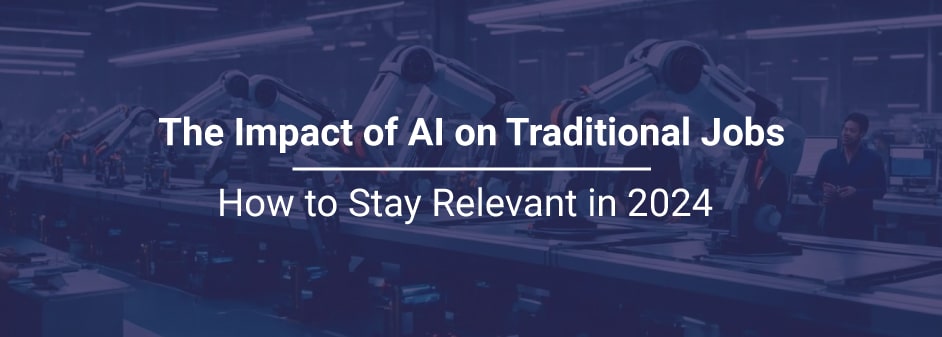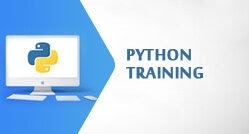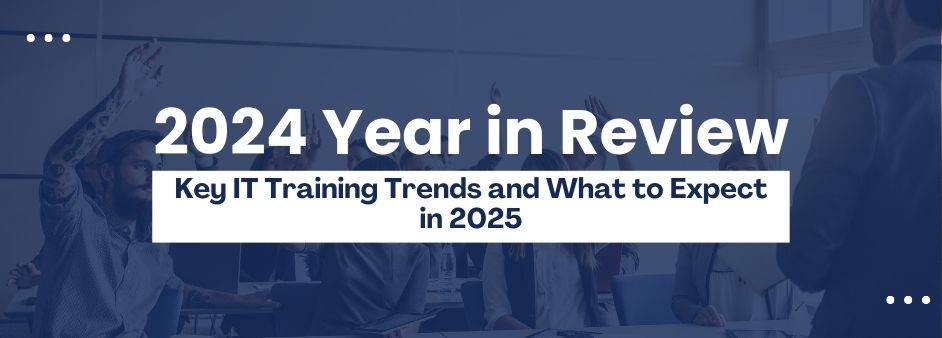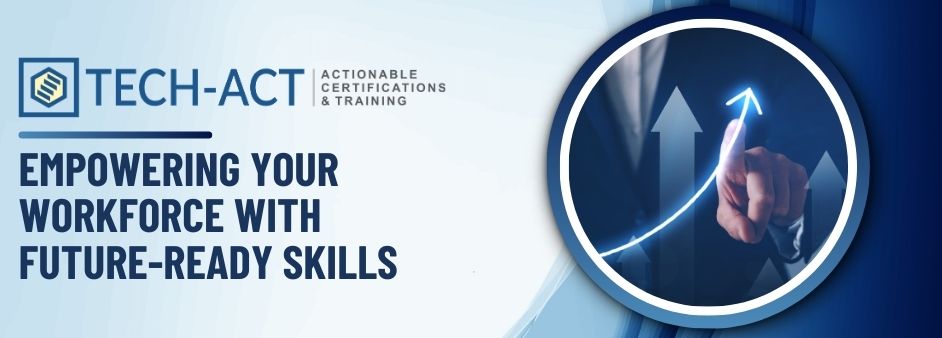The Impact of AI on Traditional Jobs: How to Stay Relevant in 2024

Artificial Intelligence (AI) is reshaping the job landscape, automating tasks, and creating new opportunities. For professionals in traditional roles, staying relevant requires adapting to these changes and acquiring new skills. This guide explores the impact of AI on traditional jobs and offers strategies to transition into AI-driven roles.
Introduction
The advent of AI is transforming traditional jobs across various industries. Professionals must adapt to these changes to stay relevant. This guide provides practical strategies to help you transition into AI-driven roles and future-proof your career.
Understanding the Impact of AI on Traditional Jobs
AI is automating repetitive tasks, enhancing decision-making, and driving efficiency. While this leads to job displacement in some areas, it also creates new opportunities in others. Understanding this impact is the first step toward staying relevant.
Key Industries Affected by AI
Manufacturing
AI-driven automation in manufacturing enhances productivity and quality control. Robots and AI systems handle repetitive tasks, allowing human workers to focus on more complex roles.
Healthcare
AI aids in diagnostics, treatment planning, and patient care. Professionals must adapt by learning to work alongside AI tools and systems.
Finance
AI is revolutionizing finance through fraud detection, risk management, and personalized banking services. Financial professionals need to embrace AI-driven tools to enhance their roles.
Retail
AI impacts retail by optimizing supply chains, personalizing customer experiences, and managing inventory. Retail workers must adapt to AI-enhanced environments.
Transportation
AI drives advancements in autonomous vehicles, logistics, and route optimization. Transportation professionals should develop skills to work with AI technologies.
Skills at Risk of Automation
Routine and repetitive tasks are most at risk of automation. Jobs involving data entry, basic analysis, and routine decision-making are likely to be affected. Professionals should focus on developing skills that complement AI.
Embracing Lifelong Learning
Adapting to AI requires a commitment to lifelong learning. Continuously updating your skills and knowledge ensures you remain competitive in an AI-driven job market.
Developing Technical Skills
Basic Programming
Learning basic programming languages like Python can help you understand and work with AI systems. Many online courses offer beginner-friendly programming lessons.
Data Literacy
Understanding data is crucial in an AI-driven world. Learn to interpret and analyze data using tools like Excel, SQL, and data visualization software.
Understanding AI and Machine Learning
Gain a fundamental understanding of AI and machine learning concepts. Online courses, books, and tutorials can provide a solid foundation.
Enhancing Soft Skills
Creativity
Creativity is a uniquely human skill that AI cannot replicate. Enhancing your creativity can make you valuable in roles that require innovative thinking.
Critical Thinking
AI can analyze data, but it still requires human input for decision-making. Critical thinking skills are essential for interpreting AI-generated insights.
Emotional Intelligence
Emotional intelligence is crucial for managing teams, understanding customer needs, and fostering a collaborative work environment. Develop your ability to empathize and communicate effectively.
Leveraging Your Industry Experience
Domain Knowledge
Your industry experience is valuable. Use your domain knowledge to identify AI applications that can solve specific problems within your field.
Customer Insights
Understanding customer needs and behaviors can help you develop AI-driven solutions that enhance customer experiences.
Problem-Solving
Your problem-solving skills can be enhanced by AI tools. Learn to use AI to analyze problems and develop innovative solutions.
Exploring AI-Related Roles
Data Analyst
Data analysts interpret and visualize data to provide insights. Learning data analysis and visualization tools can help you transition into this role.
AI Consultant
AI consultants advise organizations on implementing AI solutions. Combining your industry experience with AI knowledge can make you an effective consultant.
Machine Learning Engineer
Machine learning engineers build and deploy AI models. This role requires advanced technical skills, including programming and machine learning.
Practical Steps to Transition
Taking Online Courses
Enroll in online courses to learn AI-related skills. Platforms like Coursera, edX, and Udacity offer courses on AI, machine learning, and data analysis.
Participating in Workshops and Bootcamps
Attend workshops and bootcamps to gain hands-on experience. These intensive programs can accelerate your learning and skill development.
Building a Portfolio
Create a portfolio showcasing your AI projects. Include examples of data analysis, machine learning models, and AI applications relevant to your industry.
Networking and Professional Development
Joining AI Communities
Join AI communities to connect with professionals and stay updated on industry trends. Participate in discussions, share knowledge, and learn from others.
Attending Industry Conferences
Attend AI and industry-specific conferences to network, learn from experts, and discover the latest advancements in AI technology.
Engaging in Online Forums
Participate in online forums and social media groups dedicated to AI. Engage in conversations, ask questions, and share your insights.
Seeking Mentorship and Guidance
Find mentors who can guide you through your transition. Experienced professionals can provide valuable advice, support, and networking opportunities.
Staying Updated with AI Trends
AI is a rapidly evolving field. Stay informed about the latest trends, technologies, and research by following AI news, reading journals, and subscribing to relevant newsletters.
Conclusion
The impact of AI on traditional jobs is significant, but with the right strategies, professionals can stay relevant and transition into AI-driven roles. Embrace lifelong learning, develop both technical and soft skills, and leverage your industry experience to thrive in an AI-powered future.
FAQs
What skills are most at risk of automation by AI?
Routine and repetitive tasks, such as data entry and basic analysis, are most at risk of automation by AI.
How can I start learning AI if I have no technical background?
Begin with online courses that cover AI fundamentals, programming basics, and data literacy. Platforms like Coursera, edX, and Udacity are excellent starting points.
What are some AI-related roles I can transition into?
Consider roles such as data analyst, AI consultant, and machine learning engineer. Each role requires different levels of technical expertise.
How important are soft skills in an AI-driven job market?
Soft skills like creativity, critical thinking, and emotional intelligence are crucial as they complement technical skills and enhance your ability to work effectively with AI technologies.
How can I stay updated with the latest AI trends?
Follow AI news, read journals, subscribe to newsletters, and participate in AI communities and industry conferences to stay informed about the latest trends and advancements.
Artificial Intelligence (AI) is reshaping the job landscape, automating tasks, and creating new opportunities. For professionals in traditional roles, staying relevant requires adapting to these changes and acquiring new skills. This guide explores the impact of AI on traditional jobs and offers strategies to transition into AI-driven roles.
Introduction
The advent of AI is transforming traditional jobs across various industries. Professionals must adapt to these changes to stay relevant. This guide provides practical strategies to help you transition into AI-driven roles and future-proof your career.
Understanding the Impact of AI on Traditional Jobs
AI is automating repetitive tasks, enhancing decision-making, and driving efficiency. While this leads to job displacement in some areas, it also creates new opportunities in others. Understanding this impact is the first step toward staying relevant.
Key Industries Affected by AI
Manufacturing
AI-driven automation in manufacturing enhances productivity and quality control. Robots and AI systems handle repetitive tasks, allowing human workers to focus on more complex roles.
Healthcare
AI aids in diagnostics, treatment planning, and patient care. Professionals must adapt by learning to work alongside AI tools and systems.
Finance
AI is revolutionizing finance through fraud detection, risk management, and personalized banking services. Financial professionals need to embrace AI-driven tools to enhance their roles.
Retail
AI impacts retail by optimizing supply chains, personalizing customer experiences, and managing inventory. Retail workers must adapt to AI-enhanced environments.
Transportation
AI drives advancements in autonomous vehicles, logistics, and route optimization. Transportation professionals should develop skills to work with AI technologies.
Skills at Risk of Automation
Routine and repetitive tasks are most at risk of automation. Jobs involving data entry, basic analysis, and routine decision-making are likely to be affected. Professionals should focus on developing skills that complement AI.
Embracing Lifelong Learning
Adapting to AI requires a commitment to lifelong learning. Continuously updating your skills and knowledge ensures you remain competitive in an AI-driven job market.
Developing Technical Skills
Basic Programming
Learning basic programming languages like Python can help you understand and work with AI systems. Many online courses offer beginner-friendly programming lessons.
Data Literacy
Understanding data is crucial in an AI-driven world. Learn to interpret and analyze data using tools like Excel, SQL, and data visualization software.
Understanding AI and Machine Learning
Gain a fundamental understanding of AI and machine learning concepts. Online courses, books, and tutorials can provide a solid foundation.
Enhancing Soft Skills
Creativity
Creativity is a uniquely human skill that AI cannot replicate. Enhancing your creativity can make you valuable in roles that require innovative thinking.
Critical Thinking
AI can analyze data, but it still requires human input for decision-making. Critical thinking skills are essential for interpreting AI-generated insights.
Emotional Intelligence
Emotional intelligence is crucial for managing teams, understanding customer needs, and fostering a collaborative work environment. Develop your ability to empathize and communicate effectively.
Leveraging Your Industry Experience
Domain Knowledge
Your industry experience is valuable. Use your domain knowledge to identify AI applications that can solve specific problems within your field.
Customer Insights
Understanding customer needs and behaviors can help you develop AI-driven solutions that enhance customer experiences.
Problem-Solving
Your problem-solving skills can be enhanced by AI tools. Learn to use AI to analyze problems and develop innovative solutions.
Exploring AI-Related Roles
Data Analyst
Data analysts interpret and visualize data to provide insights. Learning data analysis and visualization tools can help you transition into this role.
AI Consultant
AI consultants advise organizations on implementing AI solutions. Combining your industry experience with AI knowledge can make you an effective consultant.
Machine Learning Engineer
Machine learning engineers build and deploy AI models. This role requires advanced technical skills, including programming and machine learning.
Practical Steps to Transition
Taking Online Courses
Enroll in online courses to learn AI-related skills. Platforms like Coursera, edX, and Udacity offer courses on AI, machine learning, and data analysis.
Participating in Workshops and Bootcamps
Attend workshops and bootcamps to gain hands-on experience. These intensive programs can accelerate your learning and skill development.
Building a Portfolio
Create a portfolio showcasing your AI projects. Include examples of data analysis, machine learning models, and AI applications relevant to your industry.
Networking and Professional Development
Joining AI Communities
Join AI communities to connect with professionals and stay updated on industry trends. Participate in discussions, share knowledge, and learn from others.
Attending Industry Conferences
Attend AI and industry-specific conferences to network, learn from experts, and discover the latest advancements in AI technology.
Engaging in Online Forums
Participate in online forums and social media groups dedicated to AI. Engage in conversations, ask questions, and share your insights.
Seeking Mentorship and Guidance
Find mentors who can guide you through your transition. Experienced professionals can provide valuable advice, support, and networking opportunities.
Staying Updated with AI Trends
AI is a rapidly evolving field. Stay informed about the latest trends, technologies, and research by following AI news, reading journals, and subscribing to relevant newsletters.
Conclusion
The impact of AI on traditional jobs is significant, but with the right strategies, professionals can stay relevant and transition into AI-driven roles. Embrace lifelong learning, develop both technical and soft skills, and leverage your industry experience to thrive in an AI-powered future.
FAQs
What skills are most at risk of automation by AI?
Routine and repetitive tasks, such as data entry and basic analysis, are most at risk of automation by AI.
How can I start learning AI if I have no technical background?
Begin with online courses that cover AI fundamentals, programming basics, and data literacy. Platforms like Coursera, edX, and Udacity are excellent starting points.
What are some AI-related roles I can transition into?
Consider roles such as data analyst, AI consultant, and machine learning engineer. Each role requires different levels of technical expertise.
How important are soft skills in an AI-driven job market?
Soft skills like creativity, critical thinking, and emotional intelligence are crucial as they complement technical skills and enhance your ability to work effectively with AI technologies.
How can I stay updated with the latest AI trends?
Follow AI news, read journals, subscribe to newsletters, and participate in AI communities and industry conferences to stay informed about the latest trends and advancements.




























